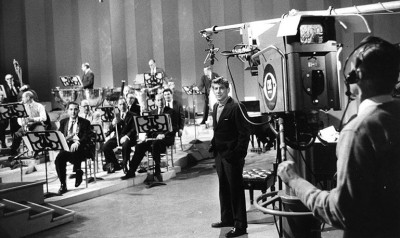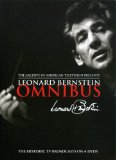| Reviews & Columns |
|
Reviews DVD TV on DVD Blu-ray 4K UHD International DVDs In Theaters Reviews by Studio Video Games Features Collector Series DVDs Easter Egg Database Interviews DVD Talk Radio Feature Articles Columns Anime Talk DVD Savant Horror DVDs The M.O.D. Squad Art House HD Talk Silent DVD
|
DVD Talk Forum |
|
|
| Resources |
|
DVD Price Search Customer Service #'s RCE Info Links |
|
Columns
|
|
|
Leonard Bernstein: Omnibus - The Historic TV Broadcasts

The releases that have emerged thus far from the partnership between E1 Entertainment and The Archive of American Television (which include Orson Welles in an adaptation of King Lear, along with a wonderful Studio One Anthology) remind us that, in its first decade or two, television was filled with the promise of boundless creativity, where true artists experimented with form and content. In the newly-built playground of the medium, writers like Paddy Chayefsky and Rod Serling flourished, directors such as Robert Altman and Sidney Lumet cut their teeth, and serious intellectuals like Mortimer Adler, Aldous Huxley, and William F. Buckley, Jr., were guests on chat shows. Television also offered regularly-scheduled educational programming aimed at adults. One such program was Omnibus, hosted by the great English Yankophile Alistair Cooke, on-and-off (and on different networks) from 1952 to 1961. This collection of Omnibus programs gathers all seven episodes that featured lectures and performances on classical music by composer and conductor Leonard Bernstein.
Bernstein has a lively, engaging, down-to-earth style, despite the "high culture" origins of his subject matter. His enthusiasm, encyclopedic knowledge, and innovative style of presentation guarantee a renewed interest in classical music for anyone who watches these specials. Although some of the terminology may go over their heads, even young children will be fascinated by the engaging material here, much of which is elucidated in a surprisingly visual way. Each episode utilizes a slightly different mode of presentation, depending on the material at hand.
Beethoven's Fifth Symphony features Bernstein standing on a large stage with the first page of Beethoven's score replicated on its surface. As an exploration of the opening movement's iconic fame, Bernstein looks at Beethoven's own discarded musical sketches - first at the piano and then by conducting the Symphony of the Air (the reformed NBC Studio Orchestra). By replacing portions of the final work with earlier draft versions, Bernstein illustrates Beethoven's ability to locate the "correct" content through a process that combined a sense of organic evolution with creative intuition. The program concludes with a full performance of the symphony's first movement.
In The World of Jazz Bernstein steps out of the realm of classical music and performs a deep, forensic dissection of jazz music, an area in which his expertise was equally refined. He avoids the historical approach - "Up the river from New Orleans," as he puts it - and instead opts to look at jazz from a purely musical point of view, describing what notes and chords make jazz special. He refers to the sense of "play" in the music and the emotional frankness behind it. Diving into the nuts and bolts, Bernstein delivers what is in many ways a definitive introductory master class on syncopation and jazz dynamics.
The Art of Conducting answers one of the first questions asked by just about anybody who's attended a performance by an orchestra: What the hell is that pretentious showboat doing up there? Bernstein was primarily known to the public as a conductor, although his achievements as a composer may outlast his influence in the former arena. This program sheds light on one of the most obscure areas of classical and orchestral music. Bernstein digs down into some very technical material that rewards close viewer attention. Briefly put, the conductor is in charge of interpreting the music and directing very precise details of an orchestral performance. This program is one of my favorites on this excellent set.
Next, Bernstein traces the development and characteristics of American Musical Comedy. As the composer of West Side Story, Candide, and On the Town, Bernstein himself was a major contributor to the form. Broadcast in 1956, this episode was developed as Candide was preparing to open on Broadway, and it includes several specially-staged excerpts. Bernstein places musical comedy into context, as a form that combines elements from prior theatrical genres - such as vaudeville and grand opera - resulting in something unique.
Introduction to Modern Music demystifies the work of composers generally considered avant-garde in the 1950s - and not broadly appreciated by middle-class audiences. Beginning with the topic of tonality, Bernstein explores why and how such harsh sounds began to arise from the orchestra and other nontraditional sources (electronic machines and prepared pianos, for instance). Again, it gets very technical and specific, an approach the respects rather than doubts the viewer's intelligence.
The Music of J.S. Bach takes us back to the highpoint of the development of classical music. We begin with a segment that shows Bernstein preparing a performance of Bach's music with the orchestra. Following this, he conducts excerpts from Bach that display the composer's vast range of musical forms and sounds. It's a great introduction that provides a platform for Bernstein's in-depth discussion of Bach's compositional style and temperament.
In What Makes Opera Grand? Bernstein directs scenes from a production of La Boheme in between a discussion of opera's defining characteristics, both musical and dramatic.
The DVD
The Video and Audio
These programs were taken from source material over 50 years old. The full-screen black-and-white images were first broadcast live, and look pretty good considering their age. Although the images flicker and there are lots of shadows, these are source defects that mostly would have been visible to viewers in the 1950s, too. It would appear that significant restoration work has been done, since many programs from the same time - including The Honeymooners - look a lot worse than this set. Audio is monaural and is okay; there's the expected hissing and popping, but the music comes across pretty clearly. In any case, the tracks aren't damaged or lacking in a distracting way.
The Extras
On Disc 4, a bonus program has been included to bring the total for the set up to eight: it's a selection of scenes from Handel's Messiah, broadcast as a special Christmas episode of Omnibus in 1955. The performance is by Bernstein conducting the Symphony of the Air, with Schola Cantorum of New York directed by Hugh Ross.
Final Thoughts
This is an exemplary group of educational documentaries. Each is entertaining and engaging in its own right. As a group, they reawakened my own somewhat dormant interest in classical music. This is a very nice package from E1 and The Archive of American Television. Highly recommended.
|
| Popular Reviews |
| Sponsored Links |
|
|
| Sponsored Links |
|
|
| Release List | Reviews | Shop | Newsletter | Forum | DVD Giveaways | Blu-Ray | Advertise |
|
Copyright 2024 DVDTalk.com All Rights Reserved. Legal Info, Privacy Policy, Terms of Use,
Manage Preferences,
Your Privacy Choices | |||||||














